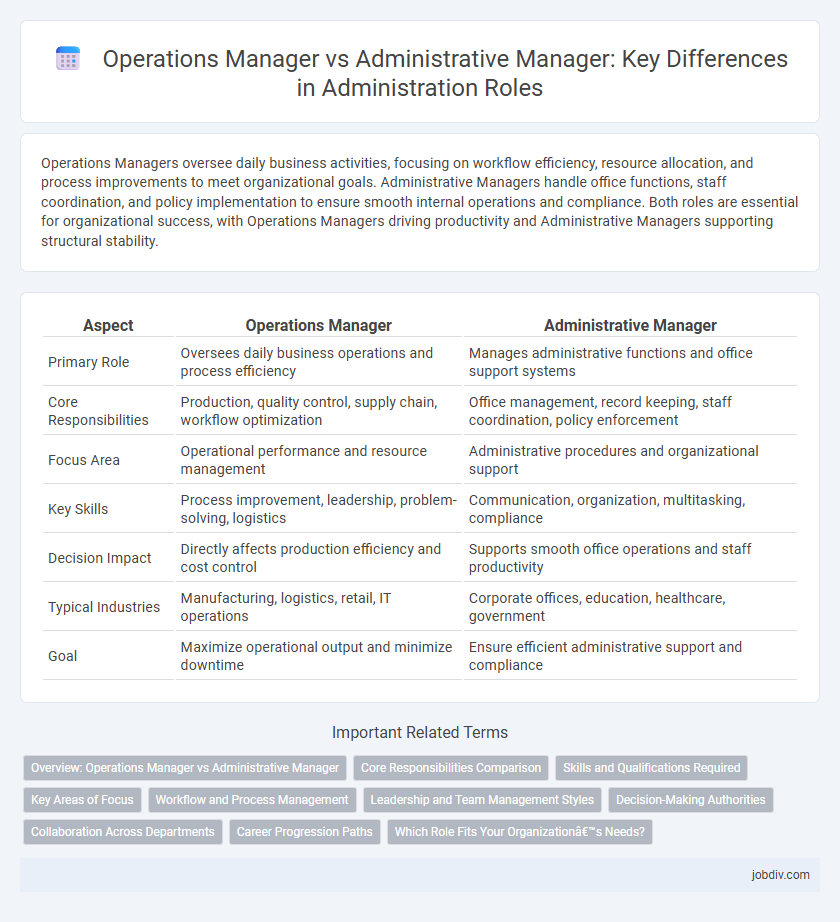Operations Managers oversee daily business activities, focusing on workflow efficiency, resource allocation, and process improvements to meet organizational goals. Administrative Managers handle office functions, staff coordination, and policy implementation to ensure smooth internal operations and compliance. Both roles are essential for organizational success, with Operations Managers driving productivity and Administrative Managers supporting structural stability.
Table of Comparison
| Aspect | Operations Manager | Administrative Manager |
|---|---|---|
| Primary Role | Oversees daily business operations and process efficiency | Manages administrative functions and office support systems |
| Core Responsibilities | Production, quality control, supply chain, workflow optimization | Office management, record keeping, staff coordination, policy enforcement |
| Focus Area | Operational performance and resource management | Administrative procedures and organizational support |
| Key Skills | Process improvement, leadership, problem-solving, logistics | Communication, organization, multitasking, compliance |
| Decision Impact | Directly affects production efficiency and cost control | Supports smooth office operations and staff productivity |
| Typical Industries | Manufacturing, logistics, retail, IT operations | Corporate offices, education, healthcare, government |
| Goal | Maximize operational output and minimize downtime | Ensure efficient administrative support and compliance |
Overview: Operations Manager vs Administrative Manager
Operations Manager oversees the production of goods or services, focusing on optimizing processes, managing supply chains, and ensuring efficient resource utilization to meet business objectives. Administrative Manager handles office management, coordinates administrative tasks, supervises support staff, and maintains organizational policies to support daily operations and enhance workplace efficiency. Both roles require leadership skills, but Operations Managers concentrate on operational workflows, while Administrative Managers focus on administrative support and organizational infrastructure.
Core Responsibilities Comparison
Operations Managers oversee daily business activities, ensuring efficient production, quality control, and resource allocation to meet organizational goals. Administrative Managers focus on managing office functions, including staff supervision, budget planning, and maintaining effective communication systems. Both roles require leadership skills, yet Operations Managers emphasize process optimization, while Administrative Managers prioritize organizational support and administrative compliance.
Skills and Qualifications Required
Operations Managers require strong analytical skills, proficiency in project management, and expertise in optimizing supply chain processes, often supported by a background in business administration or industrial engineering. Administrative Managers need exceptional organizational abilities, excellent communication skills, and a deep understanding of office management software, typically backed by experience in human resources or administrative support. Both roles demand leadership capabilities and problem-solving skills, but Operations Managers emphasize operational efficiency while Administrative Managers focus on coordination and support functions.
Key Areas of Focus
Operations Managers concentrate on optimizing production processes, managing supply chains, and enhancing operational efficiency to drive business performance. Administrative Managers oversee office management, coordinate clerical functions, and ensure compliance with company policies to maintain organizational support. Both roles require leadership skills but differ in scope, with Operations Managers focusing on workflow execution and Administrative Managers emphasizing administrative support systems.
Workflow and Process Management
Operations Managers streamline workflow by optimizing production processes and resource allocation to enhance overall efficiency. Administrative Managers focus on developing and enforcing office policies, managing clerical staff, and ensuring smooth communication across departments. Both roles require proficiency in workflow optimization, but Operations Managers emphasize process engineering while Administrative Managers prioritize organizational coordination.
Leadership and Team Management Styles
Operations Managers employ directive leadership, emphasizing process optimization and efficiency, often using performance metrics to guide team activities. Administrative Managers adopt a more participative leadership style, fostering collaboration and focusing on organizational support functions and employee development. Both roles require strong communication skills, but Operations Managers prioritize task-oriented management while Administrative Managers focus on facilitating teamwork and administrative coordination.
Decision-Making Authorities
Operations Managers hold decision-making authority primarily over production efficiency, resource allocation, and workflow optimization to meet organizational goals. Administrative Managers focus on policy implementation, office administration, and managing support services such as human resources, ensuring compliance and smooth internal operations. The key distinction lies in Operations Managers making strategic decisions impacting day-to-day operational output, while Administrative Managers control decisions related to organizational policies and administrative procedures.
Collaboration Across Departments
Operations Managers drive cross-departmental collaboration by streamlining workflows, optimizing resource allocation, and ensuring alignment with organizational goals. Administrative Managers facilitate communication between teams, coordinate support services, and implement policies to enhance efficiency and compliance. Both roles leverage their unique strengths to foster a unified environment that promotes seamless interdepartmental cooperation and productivity.
Career Progression Paths
Operations Managers typically advance from roles such as Operations Coordinator or Project Manager, gaining expertise in process optimization and team leadership to eventually reach senior management or director positions. Administrative Managers often progress from administrative assistant or office supervisor roles, building skills in organizational management and compliance to move into executive administrative or office management leadership. Career growth for both paths depends on expanding strategic planning capabilities, cross-functional knowledge, and leadership experience within the company structure.
Which Role Fits Your Organization’s Needs?
Operations Managers focus on optimizing production, logistics, and overall workflow efficiency, making them ideal for organizations prioritizing process improvement and resource management. Administrative Managers oversee office functions, personnel coordination, and compliance, fitting companies that need structured support for internal operations and employee management. Evaluating your organization's primary challenges--whether operational efficiency or administrative order--helps determine the role that best aligns with your strategic goals.
Operations Manager vs Administrative Manager Infographic

 jobdiv.com
jobdiv.com